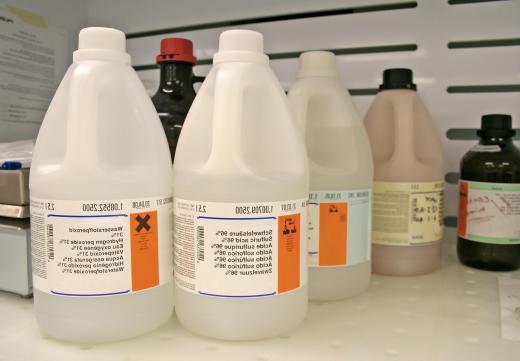What is Sulfuric Acid?
Sulfuric acid is an oily, colorless liquid with no odor. It is a key component in batteries, wastewater treatment, ore production, and fertilizer creation. Sixty-five percent of all fertilizers available on the market today are created from a combination of this acid and other chemicals. It is created from inorganic materials through a process that utilizes a special type of chemical reaction. More than 40 million tons are produced annually in the United States alone.
When sulfur compounds are burned, sulfur dioxide gas is left behind. When sulfur dioxide gas is heated to 450°F (232°C), the combination turns into sulfur trioxide. Jabir Ibn Hayyan mixed sulfur trioxide with water to create sulfuric acid in the 8th century. A century later, Ibn Zakariya al-Razi, a Persian physician and alchemist, continued studying the acid and discovered it had the ability to destroy iron and copper oxide.

A variety of substances can be mixed with sulfuric acid in order to create new products. Sulfur can be mixed with forms of aluminum to create aluminum sulfates. When aluminum sulfates are mixed with wood pulp, the fibers bond together and create paper. Aluminum sulfates mixed with dioxides create a mixture that takes impurities out of water. These aluminum dioxides are commonly used at water treatment plants.

Cyclohexanoneoxime and sulfuric acid combine to make caprolactum. Caprolactum is used to make nylon. Hydrochloric acid is another creation derived from this acid that is commonly used in the world today. In addition, sodiums and sulfuric acids are combined to help refine petroleum in order to create gasoline.
Due to the acid's unstable properties, it is essential for those combining it with water to add it to the water and not the other way around. If water is poured into sulfuric acid, a volatile explosion of boiling water can be created. Though the acid is non-flammable, it can create hydrogen gas, which is highly volatile.
AS FEATURED ON:
AS FEATURED ON:















Discussion Comments
How is sulfuric acid manufactured? What are the hazards involved in storing and transporting sulfuric acid? What happens if there is a spill?
What are the uses of sulphuric acid in our daily life?
what is a compound molecular sketch of sulfuric acid?
What is Sulfuric water?
What is sulfuric acid commonly used in?
Why is sulfuric acid used in disinfectants such as Ajax? Does it have any anti bacterial properties? Does it cut through grease? What does it actually do? Please answer.
is sulphuric acid electrically conductive when diluted or concentrated?
"Can sulfuric acid be changed into a non-corrosive liquid? "
You can dilute it with water. Likewise if you add a caustic to it I would assume the right balance could bring it back to a neutral pH level.
no, sulphuric (sulfuric) acid does not melt glass. Neither does HCl, which is supposed to be extremely acidic. it causes acid rain. i think it smells like old eggs or something similar.
what acid can react with concrete cement?
Can sulfuric acid melt glass?
I know it conducts electricity, but can it turn into a gas when electricity passes through it?
is sulfuric acid the same as sulfur the stuff that is in gun powder. (black powder)
How does sulfuric acid affect the environment and aquatic life?
How does sulfuric acid affect the liver?
What are the factors and conditions of manufacturing sulfuric acid?
would high levels of sulfuric acid in the body cause fingers to contract?
If sulfuric acid is so bad, why is it being used in Albuterol inhalation solution? I have COPD, and I use the albuterol solution in my nebulizer twice a day. How does this affect my lungs?
Can sulfuric acid be changed into a non-corrosive liquid?
how does this acid destroy nature?
Why does sulfuric acid smell like nothing? Most chemicals with the ending 'acid' are supposed to smell putrid, but sulfuric acid doesn't. Does anyone know why?
how long can sulfuric acid stored in same container also what would be concentration level of sulfuric acid (98.5%) now which has been stored in a tank for the past 7 years?
which is correct structural formula for sulphuric acid; one which has all atoms single covalent bonded or the one in which oxygens are doubly bonded to S. explain mechanism for the sulhonation of benzene, how is so3 electrohile formed?
how is sulfuric acid identified now?
Post your comments